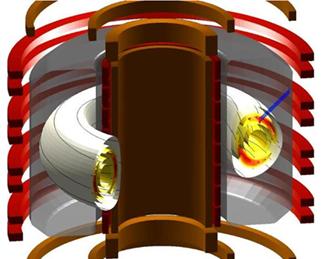EPFL doctorate Award 2013 - Federico Felici

© 2013 EPFL
Real-Time Control of Tokamak Plasmas: from Control of Physics to Physics-Based Control. Thesis EPFL n° 5203. Dirs.: Olivier Sauter & Timothy Goodman
"For having demonstrated theoretically and experimentally the usefulness and feasibility of using physics-based models as the foundation of real time control of tokamaks and opening the way to better optimised fusion plasmas."
 Abstract: Plasmas in a tokamak, a type of experimental fusion reactor, must be carefully controlled in order to obtain high pressures while suppressing instabilities. In this thesis, several plasma control problems were addressed in EPFLs TCV tokamak using a variety of control techniques. Magneto-hydrodynamic instabilities, which degrade the quality of the plasma confinement, were controlled and suppressed. This required developing new real-time control algorithms for the power and injection angles of concentrated high-power microwaves. Also, a new paradigm for control of internal distribution of the plasma current was demonstrated, which relies on a real-time numerical simulation of the plasma, performed in parallel to the physical evolution of the plasma. This method gives a prediction of the plasma state at any given time, which is then corrected using real-time diagnostic measurements. Optimal control methods were applied to the formation phase of a tokamak plasma, showing that a current ramp with precisely timed auxiliary heating and current drive can yield stationary plasmas more rapidly while satisfying physical and engineering constraints. These techniques will contribute to more reliable, predictable and better controlled plasmas in today’s tokamaks and the future ITER fusion reactor.
Abstract: Plasmas in a tokamak, a type of experimental fusion reactor, must be carefully controlled in order to obtain high pressures while suppressing instabilities. In this thesis, several plasma control problems were addressed in EPFLs TCV tokamak using a variety of control techniques. Magneto-hydrodynamic instabilities, which degrade the quality of the plasma confinement, were controlled and suppressed. This required developing new real-time control algorithms for the power and injection angles of concentrated high-power microwaves. Also, a new paradigm for control of internal distribution of the plasma current was demonstrated, which relies on a real-time numerical simulation of the plasma, performed in parallel to the physical evolution of the plasma. This method gives a prediction of the plasma state at any given time, which is then corrected using real-time diagnostic measurements. Optimal control methods were applied to the formation phase of a tokamak plasma, showing that a current ramp with precisely timed auxiliary heating and current drive can yield stationary plasmas more rapidly while satisfying physical and engineering constraints. These techniques will contribute to more reliable, predictable and better controlled plasmas in today’s tokamaks and the future ITER fusion reactor.
Full Text: Real-Time Control of Tokamak Plasmas: from Control of Physics to Physics-Based Control